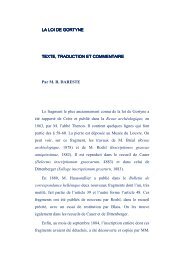CYPRIOT GRAMMAR
CYPRIOT GRAMMAR
CYPRIOT GRAMMAR
Create successful ePaper yourself
Turn your PDF publications into a flip-book with our unique Google optimized e-Paper software.
It’s all.<br />
Κάπκοιος άλλος έσ’ει ούλον το κρίας.<br />
Somebody else has all the meat.<br />
9.1.12 Ότι, Οτιδίποτε(ς) = whatever<br />
This is pronoun is quite straightforward but it is not inflected at all for genders, cases or numbers.<br />
Ότι θέλεις έχω το.<br />
Whatever you want I have it.<br />
Οτιδίποτε εν τούτον.<br />
Whatever this is<br />
Έσ’εις ότι θέλει<br />
You have whatever he wants.<br />
9.1.13 Τίποτες/τίποτε/κουτσ’ίν = Nothing/anything<br />
This pronoun is very simple to use. It’s never inflected for neither gender nor case nor number. It can be placed at all places in a sentence.<br />
Εν χιέλω τίποτες/κουτσ’ίν<br />
I don’t want anything.<br />
Έσ’ει τίποτες να φάμεν;<br />
Is there anything to eat?<br />
Τίποτε εν έσ’ει.<br />
There is nothing.<br />
9.1.14 Κάπου = Somewhere<br />
This is pronoun is also quite straightforward since it is not inflected at all for genders, cases or numbers. Note that when the word is placed<br />
at the start of the sentence you imply that you do not know where however if you place it at the end of the sentence you are implying that<br />
you know the location but you are reluctant to reveal where and thus you are trying to be vague.<br />
Κάπου έναι<br />
He is somewhere.<br />
Επίεν κάπου<br />
He went somewhere (where exactly you rather not say)<br />
9.1.15 Κάπκοιος = Someone<br />
This is pronoun is quite straightforward. Note that it is inflected for all genders, cases and numbers. Note that when the word is placed at<br />
the start of the sentence you imply that you do not know who however if you place it at the end of the sentence you are implying that you<br />
know the person but you are reluctant to reveal it and thus you are trying to be vague.<br />
Κάπκοιος έν στην πόρταν<br />
Someone is at the door.<br />
Έσ’ει το κάπκοιος.<br />
Someone has it. (who exactly you rather not say)<br />
9.1.16 Μαγκόνας, μαγκομιά, μαγκόν = None, no one<br />
This pronoun is very simple. It is emphatic in its meaning and it is always used at the start of the sentence. It is inflected for the accusative.<br />
Almost never for the genitive and vocative. Due to its meaning there is no plural. For the corresponding pronoun for these cases look at<br />
the pronoun in 9.1.16.<br />
Μαγκόνας εν ήρτεν να με δεί.<br />
No one came to see me.<br />
Μαγκομιά γιενέκα έν ομορφόττερη μου.<br />
No woman is more beautiful than me.<br />
9.1.17 Κανένας, καμιά, κανέναν = Nobody, no thing ALSO Anyone, any (thing)<br />
This set of pronouns is also very straightforward in its usage. It can be used at all places in a sentence and is inflected for all cases but has<br />
no plural due to its meaning and nature.<br />
Ααπάσε κανένας?<br />
Does anybody love you?<br />
Κανένας εν με ααπά/Εν με ααπά κανέας<br />
28





